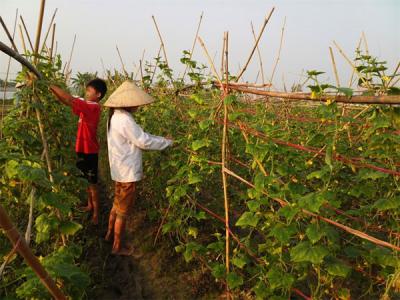New agency targets effective food quality controls

HCM City has established a Food Safety and Hygiene Management Board, the first of its kind in the country. Pham Khanh Phong Lan, head of the board that will operate on a pilot basis for three years, tells Hai Quan (Customs) that the basic aim is to improve management of food quality.
What are the main tasks of the HCM City Food Safety and Hygiene Management Board?
The board, established under Prime Minister Nguyen Xuan Phuc’s decision, will have same functions as a department with the main task of implementing prescribed legal documents.
Based on actual implementation of the legal documents and its assessment, the board will propose to the city’s People’s Committee the promulgation of guidelines and policies to further improve management of food quality in the city.
Previously, the quality of food in the city was jointly managed by departments of Health, Agriculture and Rural Development, and Industry and Commerce. In this process, there were overlaps in the application of laws. Sanctions were not strict enough, and sanction procedures remained complicated. Whenever there were problems related to food safety and hygiene, this department asked that department, wasting time. The management board has been established to address these overlapping issues, to make inspections more effective, test systems and technical barriers, thus preventing contaminated food from flooding the city.
In addition, we will reform the administrative procedures to make it easier for businesses and individuals to obtain food safety and hygiene certification.
As the first such agency in the country, what do you think are the major difficulties and pressures it will face?
The biggest problem will be the overlapping of regulations. I’m afraid the regulations will ‘kick each other’ and the limited capacity of the board will make their implementation more difficult.
Another difficulty is that sanctions of violations are not strict enough, and relevant procedures are complicated. In the past five years, a violator has been fined less than VND200,000 (US$8.8) on average. The board will propose stricter penalties.
Then, food testing is difficult. If the test takes a lot of time, for instance, between 2-3 days, the food has already been consumed. In case we seize some food and the test results show that it meets set requirements, businesses will suffer losses.
In my opinion, in order to deal with such a scenario, two things must be done.
First, it will be necessary to reorganise the food testing system and set up a suitable mechanism for having the tests done by competent bodies in the private sector, given the situation of scarce resources.
Secondly, the inspection of quality should be re-oriented. It is not about mass inspections. It should more about quick checks to screen some suspected food samples. Meanwhile, the people’s supervision of food production and trading businesses should be enhanced.
What about personnel for the board? When will it commence operations?
Currently, about 500 people from three departments have been assigned to work for six functional units under the management board: office, inspection division, licensing division, risk management and poisoning treatment division, information and media division, and quality management division.
The board will begin operations at the earliest possible, though a time has not been fixed.
What are the measures that the board will initiate to improve food safety controls in the city?
The board will consistently implement professional and constructive measures to ensure food safety. HCM City has implemented a project to build safe food chains. In my opinion, along with the inspection and control of enterprises involved in the safe food chains, the board should strengthen control over other types of food at the beginning, whether or not a type of food has been included in the safe food chain.
More than 80 per cent of the food in the city comes from other localities, so the board will advise the city’s People’s Committee to build co-ordination mechanisms with other provinces to control food quality at the place of production. This will benefit the city as well as other provinces.
In addition, the board will expand tracing the origins of certain foods. One key solution we will promote is to pilot safe food business models. Apart from measures to improve food quality management at supermarkets, the board will focus on inspections in the three wholesale markets of Binh Diêen, Thu Duc and Hoc Mon. Food inspectors will be available around the clock with the ability to get quick results after testing vegetables, seafood, meat and other types of food there.
Inspection teams in each district will be responsible for regular supervision of local food production and trading businesses, especially in big markets. A particular focus will be on collective kitchens and temporary markets for workers near industrial zones as these places carry high risks of food safety violations.
During the pilot period, the board will evaluate the effectiveness of its performance based on specific criteria. We will name the violators on the board’s website to help people know and boycott them if necessary.
Có thể bạn quan tâm
 Israeli President tours high-tech greenhouse
Israeli President tours high-tech greenhouse Picking out a lettuce leaf from the greenhouse garden, Israeli President Reuven Ruvi Rivlin had a taste of what Israeli technology has brought to Việt Nam.
 PM okays $4.4 billion package for high-tech agriculture
PM okays $4.4 billion package for high-tech agriculture Prime Minister Nguyễn Xuân Phúc has signed a resolution providing a credit package worth US$4.4 billion to invest in the development of high-tech agriculture
 Rice farmers’ income drops by seven times in last 10 years
Rice farmers’ income drops by seven times in last 10 years Vietnam, the second largest rice exporter in the world, is facing big challenges. The income of farmers has dropped by seven times in the last 10 years